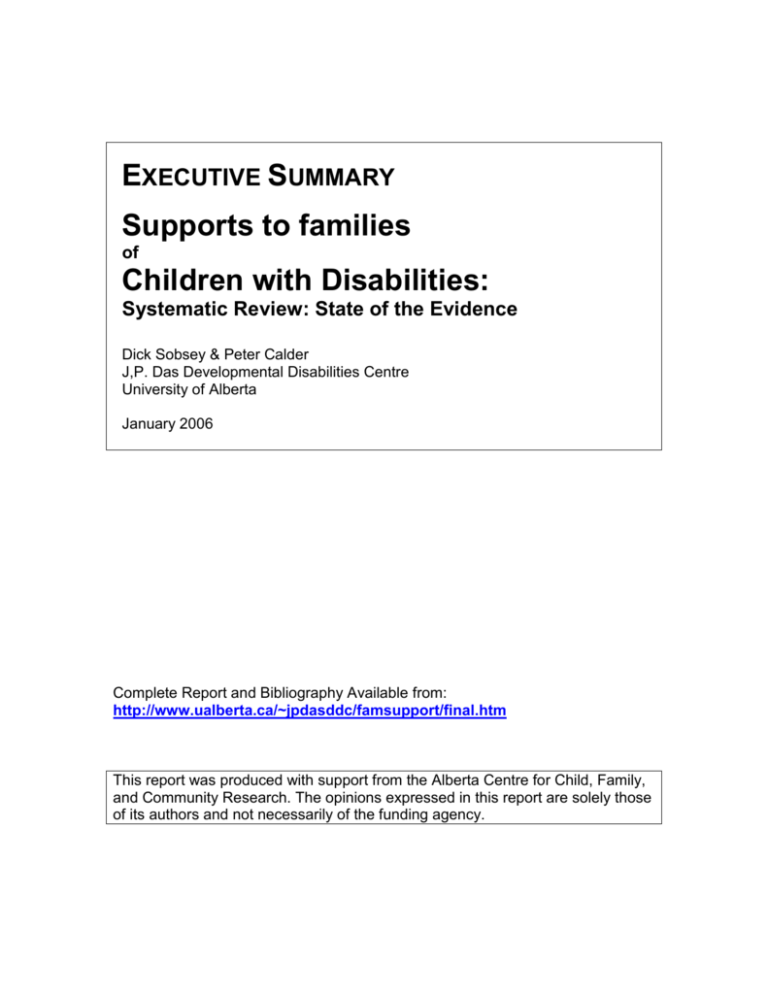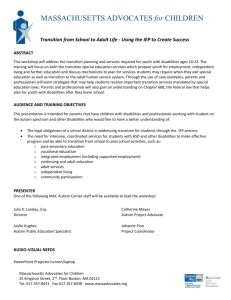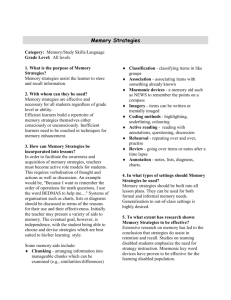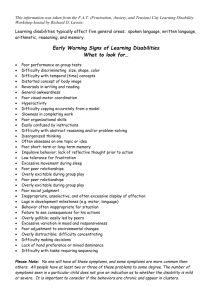Supports to families of Children with Disabilities
advertisement

EXECUTIVE SUMMARY Supports to families of Children with Disabilities: Systematic Review: State of the Evidence Dick Sobsey & Peter Calder J,P. Das Developmental Disabilities Centre University of Alberta January 2006 Complete Report and Bibliography Available from: http://www.ualberta.ca/~jpdasddc/famsupport/final.htm This report was produced with support from the Alberta Centre for Child, Family, and Community Research. The opinions expressed in this report are solely those of its authors and not necessarily of the funding agency. Supports to families of Children with Disabilities State of the Evidence Review Dick Sobsey & Peter Calder February 2006 Executive Summary This purpose of this study was to review and evaluate the state of currently available research relevant to support programs for children with disabilities. The review was designed to be of assistance to researchers, policy makers, and individuals who work with or live in families where a member is disabled. The primary goal of this project was to identify, summarize, and evaluate existing research on support services for families of children with disabilities. Research was considered to be relevant if it directly described or evaluated the effects of family support programs. Articles were included if they addressed issues that had implications for family support programs. Studies were identified primarily through electronic searches, existing studies and reviews, as well as being suggested by stakeholders, over 1000 articles were reviewed. The process resulted in an annotated bibliography of over 500 selected articles. The annotated bibliography is available in a variety of formats through the internet including RTF and MS-Word word-processing files, PDF files for printing a formatted version, and EndNote, a searchable and expandable reference library file in a bibliographic database as a resource for researchers, students, and libraries. Major Findings 1. Supports to families with children who have disabilities appear have beneficial effects on both the families and the children themselves. Early intervention is effective with a wide variety of children with disabilities including children with autism. A behavioral component appears to be valuable, but there is no clear evidence of the superiority of solely intensive behavioral interventions as opposed to more eclectic approaches to family intervention. More intervention is typically more effective than less intervention, but there is no clear evidence that some fixed number of hours per week is critical to success, and some of the early claims made for Early Intensive Behavioral Intervention on children with autism have not been supported by subsequent research. 2. The offering of support services to families with disabled children has enabled more families to care for their disabled child within a family context rather than the more expensive institutionalization or under government supervision. Family support programs were originally initiated as part of a broader community-based services approach and should continue to be viewed in that context. 3. Families differ greatly in their social and personal resources related to successful parenting of a disabled child. Different children put varying demands on their parents. The demands are more related to the 2 specific child’s needs rather than the child’s diagnostic category. The demands on the parents are not always related to the severity of the disability. Support services should take into account both the needs of families, the needs of the children, and the informal supports available from extended families and communities. Special focus should be put on economically disadvantaged and single parents who are caring for a child with a disability. The unique needs of aboriginal families and families from a variety of other cultures needs special consideration. 4. Some families with a disabled child appear to thrive while others crumble. Families vary greatly in their ability to care for the child as well care for their own needs. The manner in which a parent appraises or perceives the situation with which they are faced determines to a large degree the manner in which they will adapt. Children with identical needs can be appraised as being a “burden” to some and as being a “gift” to others. Some parents adopt a coping style of trying to live their lives exactly as they would if they did not have a child with a disability. Others adopt transformed lifestyle where they create a unique pattern of adapting that best fits their situation. Each of these styles can be successful for some families, but a rigid adherence to pre-established patterns can lead to poor adaptation in some families. Families need support to help them identify the best approach for them. This support can come through the mentorship of other families or formal counselling. More research is required to provide better guidance for this process. 5. Research should respond more to what parents perceive as needed areas of inquiry rather the agenda of researchers. Most of the current research can be characterized as being descriptive; parents appear to be more interested in studies that relate to delivery of services. Most of the published research deals with pre-school children with disabilities, parents would like to see more studies being done with older children who have disabilities. Most of the published research has a socialservice focus; parents would like to see more studies relating services of other agencies such as schools. Parents also pointed out that studies should be done on specific populations that are faced with different challenges such as aboriginal parents, foster parents and families living in rural areas. A more detailed list of findings and recommendations is included at the end of the report. 3











